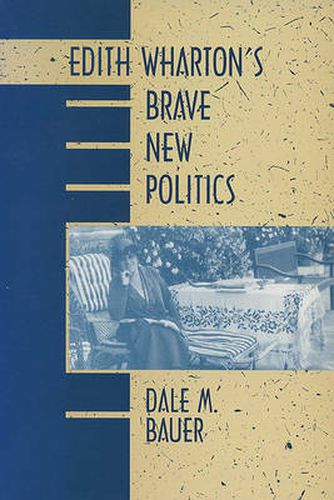Readings Newsletter
Become a Readings Member to make your shopping experience even easier.
Sign in or sign up for free!
You’re not far away from qualifying for FREE standard shipping within Australia
You’ve qualified for FREE standard shipping within Australia
The cart is loading…






Most critics claim that Edith Wharton’s creative achievement peaked with her novels
The House of Mirth
and
The Age of Innocence , dismissing her later fiction as reactionary, sensationalistic and aesthetically inferior. In
Edith Wharton’s Brave New Politics , Dale M. Bauer overturns these traditional conclusions. She shows that Wharton’s post-World War I writings are acutely engaged with the cultural debates of her day - from reproductive control, to authoritarian politics, to mass culture and its ramifications. Bauer examines the social and political critique implicit in Wharton’s later works, from
Summer
(1917) to her last novel
The Bucaneers
(published posthumously in 1938). She integrates historical, political and feminist concerns to recast Wharton’s antimodernism and to recover the novelist’s understanding of public life and private morality.
Edith Wharton’s Brave New Politics
illustrates how literary criticism can change the course of a literary career. In her refutation of the dominant interpretations of Wharton’s literary work, Bauer challenges the prevailing conception of this genteel woman of letters, showing that to read Wharton’s works in isolation from her complex politics is to misunderstand Wharton’s aims and to miss entirely the exhilarating power of these later fictions.
$9.00 standard shipping within Australia
FREE standard shipping within Australia for orders over $100.00
Express & International shipping calculated at checkout
Most critics claim that Edith Wharton’s creative achievement peaked with her novels
The House of Mirth
and
The Age of Innocence , dismissing her later fiction as reactionary, sensationalistic and aesthetically inferior. In
Edith Wharton’s Brave New Politics , Dale M. Bauer overturns these traditional conclusions. She shows that Wharton’s post-World War I writings are acutely engaged with the cultural debates of her day - from reproductive control, to authoritarian politics, to mass culture and its ramifications. Bauer examines the social and political critique implicit in Wharton’s later works, from
Summer
(1917) to her last novel
The Bucaneers
(published posthumously in 1938). She integrates historical, political and feminist concerns to recast Wharton’s antimodernism and to recover the novelist’s understanding of public life and private morality.
Edith Wharton’s Brave New Politics
illustrates how literary criticism can change the course of a literary career. In her refutation of the dominant interpretations of Wharton’s literary work, Bauer challenges the prevailing conception of this genteel woman of letters, showing that to read Wharton’s works in isolation from her complex politics is to misunderstand Wharton’s aims and to miss entirely the exhilarating power of these later fictions.